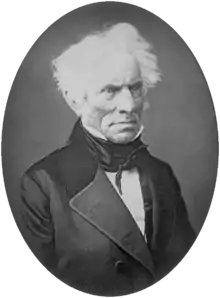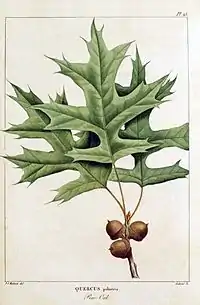François André Michaux
François André Michaux (16 August 1770 – 23 October 1855) was a French botanist, son of André Michaux and the namesake of Michaux State Forest in Pennsylvania. Michaux père botanized in North America for nearly a dozen years (1785–96) as royal collector for France.[1]

Travels
Michaux accompanied his father to the United States, and his Histoire des arbres forestiers de l'Amérique septentrionale (three volumes, 1810–13) contains the results of his explorations, giving an account of the distribution and the scientific classification of the principal American timber trees north of Mexico and east of the Rocky Mountains. Michaux trekked the Allegheny Mountains in 1789 when trans-Allegheny travel was limited to indigenous peoples' trails and one military trail, Braddock Road, built in 1751. He travelled with friend and botanist John Fraser to the summit of the Great Roan.[2]
Work

Under the title The North American Sylva Michaux's work was translated by Augustus Lucas Hillhouse.[3] The work was reissued in 1852 by Robert Smith of Philadelphia, again in three quarto volumes, and again with 156 hand colored lithographs of American trees and shrubs. A supplement of three additional volumes, trees, "...not Described in the Work of F. Andrew Michaux" was issued by Smith in 1853, in the same quarto format and with 121 additional hand colored plates. The later work, by Thomas Nuttall, describes trees of the Rockies and Pacific Coast.
François André Michaux published this monumental work[4][5][6][7] first in French and then in English translation, between 1811 and 1819. With illustrations by Pierre-Joseph Redouté and Pancrace Bessa, two masters of botanical art, his opus rapidly became a landmark in American literature and the foundation of American forestry. His work was augmented by the British botanist, Thomas Nuttall, whose work added 121 hand-colored plates to the 156 originally published with Michaux's Sylva. His additions cover eastern species overlooked by Michaux, and new species that he had gathered on his excursions in the Midwest and West.[8]
References
Notes
- Rembert, David H. Jr., André Michaux's Travels and Plant Discoveries in the Carolinas, Castanea (Journal of the Southern Appalachian Botanical Club via highbeam.com), 2004-12-1. Accessed 2013-1-8. The December 2004 issue of Castanea has a substantial number of articles on Michaux.
- Brendel, Frederick, Historical Sketch of the Science of Botany in North America from 1635 to 1840, The American Naturalist, 13:12 (Dec. 1879), pp. 754-771, The University of Chicago Press. Accessed 31 July 2012.
- Guide to the Hillhouse Family Papers (MS 282) Yale University Library
- Michaux Sylva Plates, NYPL Digital Gallery, digitalgallery.nypl.org. Accessed 2012-8-4.
- Michaux, François André (1871). The North American sylva: or, A description of the forest trees of the United States, Canada and Nova Seotia. Considered particularly with respect to their use in the arts and their introduction into commerce. To which is added a description of the most useful of the European forest trees ... Wm. Rutter & co.
- Michaux, François André; Smith, John Jay; Hillhouse, Augustus Lucas; Thomas Nuttall (1859). The North American sylva: or, a description of the forest trees of the United States, Canada, and Nova Scotia. Considered particularly with respect to their use in the arts and their introduction into commerce. To which is added a description of the most useful of the European forest trees. D. Rice & A. N. Hart.
- Michaux, François André; Nuttall, Thomas (1859). The North American sylva. D. Rice & A.N. Hart.
- The nutshell, NNGA, vol.65, No. 1, March 2011, p.8.
- IPNI. F.Michx.
Further reading
- Downing, Andrew Jackson (1857). The Horticulturist, and Journal of rural art and rural taste. Published by Luther Tucker. p. 499.
 This article incorporates text from a publication now in the public domain: Gilman, D. C.; Peck, H. T.; Colby, F. M., eds. (1905). "François André Michaux". New International Encyclopedia (1st ed.). New York: Dodd, Mead.
This article incorporates text from a publication now in the public domain: Gilman, D. C.; Peck, H. T.; Colby, F. M., eds. (1905). "François André Michaux". New International Encyclopedia (1st ed.). New York: Dodd, Mead.
External links
 Media related to The North American Sylva at Wikimedia Commons
Media related to The North American Sylva at Wikimedia Commons- North American sylva - digital facsimiles from Linda Hall Library
- North American sylva – Michaux and Smith 1853, 3 volumes, Biodiversity Heritage Library (digital)
